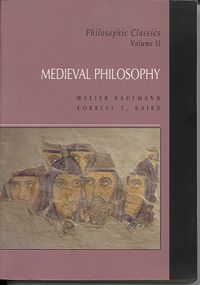
This passage is from Forrest Baird's Preface to Philosophical Classics. Vol. 2: Medieval Philosophy, ed. Walter. Kaufmann and Forrest Baird. Prentice-Hall, 1994, pp. ix-x.
The Middle Ages have been depicted as a time of intellectual sterility obsessed with trivial and tiresome questions; as a valley between two great mountain ranges Greek philosophy on one side, which medievalism distorted, and modern philosophy on the other, which happily rejected medieval precedents entirely. As late as the 1960s, medieval philosophers were described by many as being incapable of independent thought, saddled with a "sacramental" view of a God-pointing world. For example, W.T. Jones wrote in The Medieval Mind (New York: Harcourt, Brace & World, 1969),
It can hardly be denied that this sacramental point of view was a block to progress . . . [and to] many it seems equally obvious, now that this viewpoint has disappeared, that men have rid themselves of much that was a liability — ignorance, superstition, intolerance.This position led many to skip almost two millennia of human thought — from the Hellenistic philosophers to Bacon or Descartes — with only a passing nod to Augustine and Thomas Aquinas.
Much has changed. Most scholars no longer see Bacon and Descartes as the saviors of philosophy from a long medieval night. Following the lead of Etienne Gilson and others, philosphers now recognize that modern philosophy cannot be understood apart from its roots in medieval thought, that medieval philosophy was much richer than previously believed, and that medieval philosophers were as intelligent and thoughtful as the philosophers of any age. While it is true that most debates during the medieval period were framed in a "sacramental" way and that the medievals considered some answers unacceptable for religious reasons, nevertheless Christian, Jewish, and Muslim thinkers in this period did original philosophical work. Furthermore, while medieval topics may often appear only theological, they are, in fact, related to virtually every area of philosophy.